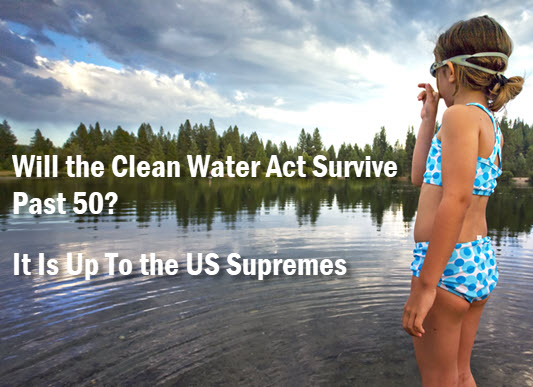Critical Clean Water Act Case To Be Decided by the US Supremes: Many of the Nation’s Wetlands Are At Risk
October 21, 2022 08:30 am

Photo: Chance Agrella via Freerange | Columbia
County Observer graphic
TALAHASSEE, FL – The Clean Water Act turns 50 this week, but parts of it are being challenged in a case before the US Supreme Court.
The case, Sackett v. EPA, could allow factories, hog farms, and wastewater plants to pollute waters in states that lack strong water-quality protections.
Jim Murphy, director of legal advocacy at the National Wildlife Federation, said the case could result in a cascading effect across the country.
Facts of the
case via
Oyez
Michael and Chantall Sackett own a residential
lot near Priest Lake, Idaho, and want to build a
home there. However, shortly after they began
placing sand and gravel, the federal
Environmental Protection Agency told them that
they could not build on their lot because
construction on the land violated the Clean
Water Act. According to the EPA, the Sacketts’
lot contained wetlands that qualify as
“navigable waters” regulated by the Act, so they
needed to remove the sand and gravel and restore
the property to its natural state.
Litigation ensued, and in 2012, the Supreme
Court permitted the Sacketts to litigate their
challenge to the EPA’s order in federal court.
During the litigation, the EPA removed its
compliance order.
The U.S. Court of Appeals for the Ninth Circuit
held that the EPA’s withdrawal of the compliance
order did not render the Sacketts’ challenge
moot and that the EPA does have jurisdiction
over their property under the Clean Water Act.
The court reasoned that, under binding circuit
precedent, “jurisdiction over wetlands depends
upon the existence of a significant nexus
between the wetlands in question and navigable
waters in the traditional sense.”
Question
What is the proper test for determining whether
wetlands are “waters of the United States” under
the Clean Water Act?
"Could potentially, depending on how the court rules, remove important federal protections from pollution and destruction for up to half of the nation's wetlands and maybe 60 to 70% of the nation's streams," he said, "including many streams that could provide the source waters for people's drinking supplies."
A new report from the National Wildlife Federation said the case, if plaintiffs are successful, would be "disproportionately felt by low-income communities and communities of color that already have inadequate water and wastewater infrastructure and face greater flood risk." Its progress report on Florida's current water quality labels it "in need of improvement."
Florida has implemented some of its own measures to protect water, including a controversial program that pays ranchers to retain runoff on their own land. Critics have said it amounts to "corporate welfare" because the ranchers get taxpayer money for doing very little.
Nationally, Murphy pointed to polls that show 75% of adults are in favor of seeing protections for more waterways and want the Environmental Protection Agency to take the lead in protecting natural waterways.
"Again, these natural systems provide functions that are very, very hard to replace," he said, "and very expensive to replace through engineering and other means."
This 14-year legal battle has brought the Sacketts to the Supreme Court for the second time. Their first was in 2012 when they were granted the right to sue the EPA. A decision is expected in 2023.
This piece was reprinted by the Columbia County Observer with permission or license. It may not be reproduced in any form without permission or license from the source. Graphics, layout, and sidebar added by the Observer.

 By
Trimmel Gomes | Public News Service
By
Trimmel Gomes | Public News Service